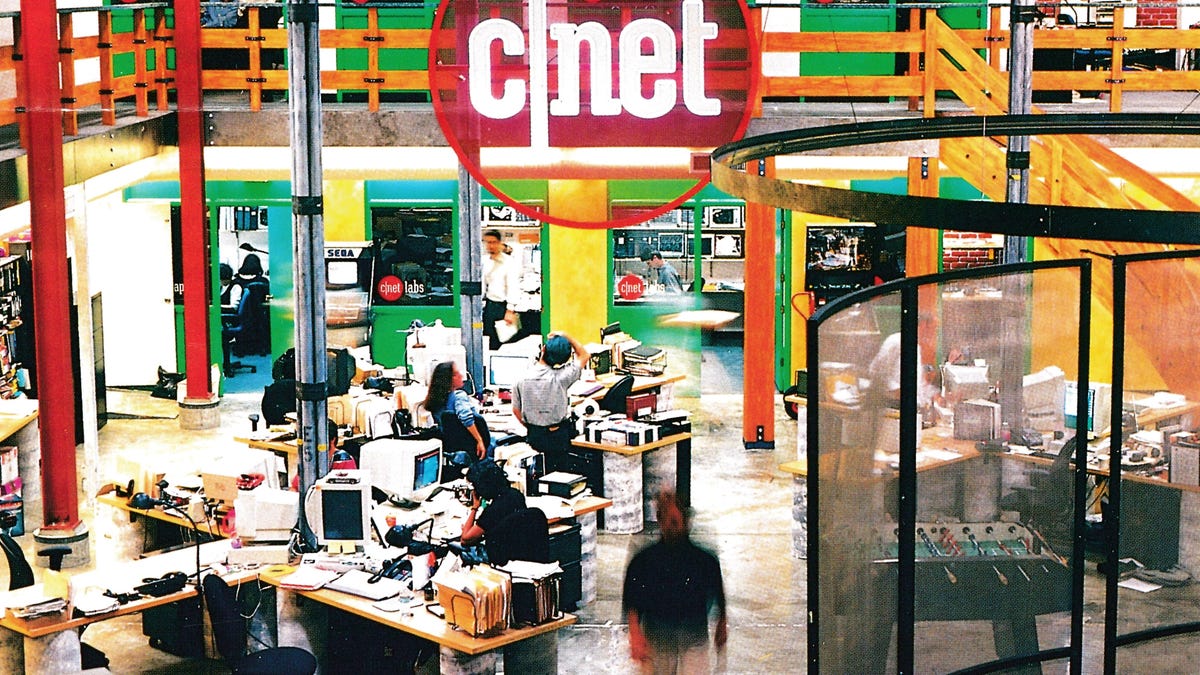When online journalism had to be built from the ground up
Clair Whitmer joined CNET in its infancy, when the rules of publishing news on the internet didn't exist. The former editor recalls the "precious gift" of creating them.

In the early days, CNET's office was part of its TV shows. When you came to work, you were on camera, no matter what your job was.
Editor's note: As part of CNET's 25th birthday feature package, we're publishing a a series of guest columns from former CNET leaders and editors. See Clair's bio below.
How do you make corrections to an article once you've published it online? When do we put hyperlinks into the content? How many times a day can we post? Won't readers be confused if we're just publishing all the time? How do we claim a scoop if everybody can just publish all the time?
Publish. Scoop. Syndicate. Hyperlink. Even the vocabulary seems quaint now.
But answering those questions felt like an important challenge. Here I am opining on the ethics of online journalism for American Journalism Review in 1998:
"When most publications make a mistake on their Web site, they cover their tracks and pretend it was never wrong. ... We felt that was disingenuous, so for any mistake of substance, we post a correction on our front page and keep it archived for several months.'"
I called it the "front page." How adorable.
I was 29. I didn't know then that a moment in which you're invited to make it all up as you go along is a precious gift.
Twenty-five years later, I not only understand the value of that moment, but I realize that I've spent most of my career since searching for other projects and groups of people who haven't figured out the rules yet.
There aren't as many as there should be, which is why I still mention CNET as a career bookend when describing my job history. It dates me now, and any competent resume coach would tell me to drop the reference from my LinkedIn profile. But I don't.
And it's not because CNET remains one of the few media brands I've worked for that survives. It's because I'm still proud of that moment.
I worked at CNET from 1996-2000, following Jai Singh, who became CNET News.com editor-in-chief, from the IDG trade weekly InfoWorld to become his first news editor. I would also work for Alice Hill and Chris Barr, CNET's first editor-in-chief, who died in 2017. I'm pretty sure I was one of the first people to refer to themselves as a "content strategist," a title I loved because no one knew what it meant.
It's hard now to communicate the newness of that moment. The big headline of the day was the browser wars between Netscape and Microsoft. AOL and AT&T were still their own beats. And everybody thought the CNET TV show was the actual big deal. When it was filming they would call us back to our desks, which they'd set up in the background of the set, so that we could be seen to type fast and stare intently at our monitors.
At InfoWorld, not that long before jumping ship for CNET, Jai had dismissed this newfangled Internet fad. He spent the first six months at CNET living that skepticism down. This moment is captured in these letters to the editor in the Nov. 27, 1995, issue of InfoWorld.
By the end of my tenure at CNET, a photo of our "pioneering" News.com team had been included in the journalism 101 textbook I'd studied at San Francisco State University. I can't find that photo or even a reference to the textbook now. In fact, I can't find any reference to anything I worked on at CNET. Wikipedia says I wrote this story in 1996, now attributed to "CNET Staffer." That's it. All I could find. Poof.
So goes life. A lot of work followed by Poof.
But in 1996, we were the future.
I realize this is a very old-person thing to say. The rate of change has accelerated to the point where, at 53, I can say old-people things like that and believe that "60 is the new 40" without any obvious symptoms of cognitive dissonance.
Maybe I'm gotten good at holding two opposite ideas in my head at the same time because, 25 years ago, in the late 1990s at CNET, I got to be part of a group of people who started a new thing in a profession then very much steeped in tradition… and no one stopped us.
I would wish this kind of "do-over" opportunity for every young person starting out in the work world. It's the most fun you can have before Poof.
Clair served at CNET for four years, starting as news editor for CNET News.com and finishing as director of content services for CNET. She would lose all of the money earned on her CNET options to AMT taxes following the dot-com collapse and subsequently moved to France for seven years. She now works in economic development, helping cities drive innovation and entrepreneurship.